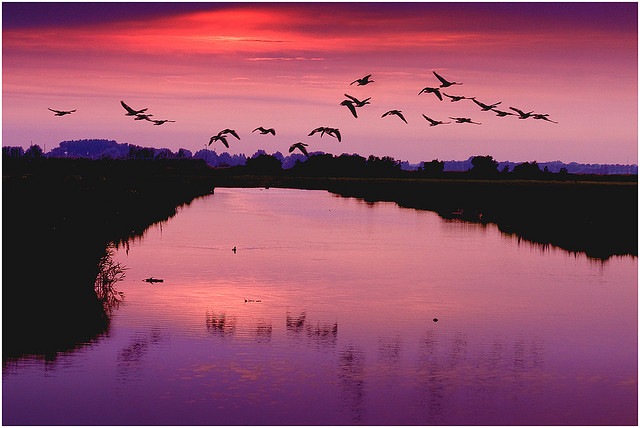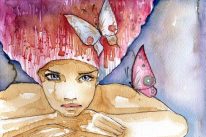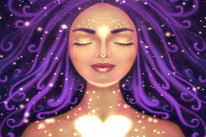
“Death is not the greatest loss in life. The greatest loss is what dies inside us while we live.” ~Norman Cousins
“What is happiness?” What a completely dense and loaded question this is.
During my studies in psychology, one of the main principles we learned about writing a manuscript is the importance of defining what you are discussing. If I were to write a paper about happiness, I would then need to operationally define happiness in terms that allowed everyone to understand what I was referring to.
The problem with this, however, is that we then merely repeat the best definition we come by, thinking we understand the meaning while never truly questioning our own thoughts on the matter; therefore never truly experiencing it.
I believe this happens in the majority of circumstances, and know that I did this for many years. It is much simpler to just go along with life rather than ask yourself those true and deep questions that will rattle your world.
My whole life I have been searching for tranquility, to feel at peace within myself, for “happiness.”
After a traumatic adolescence, I spent my life in fear, seeking control to make up for that which was taken from me. This brought me an abundance of pain and so much confusion.
But I thought I would no longer be hurt if I could control everything around me. This, for obvious reasons, never worked, and I couldn’t seem to understand why.
A special person in my life always taught me to question what I’m told. On the subject of happiness, he said that he had never heard a definition that made sense to him, and therefore, didn’t believe happiness existed.
This was the saddest thing I have ever heard. It inspired me to find a definition that would touch his heart.
Unfortunately, like with most things in life, this relationship ended, and I was never able to give him my definition. But I was still very much determined to define it, if not for him then for myself.
It wasn’t until I began writing a research paper on death and mortality for my master’s studies that I truly understood what happiness is.
My research was investigating the effects of mortality salience—simply put, how humans react to the realization that we are perpetually vulnerable to permanent obliteration for reasons that we can never anticipate or control. This was quite the handful to absorb, and many people whom I talked with experienced great difficulty coming to terms with the principle.
They frequently told me that doing a paper on death would make them depressed, and things of that nature. I had a different experience: The more I read on death and mortality, the calmer and more peaceful I found myself.
It took a few days for me to realize that this tranquility I was experiencing was the happiness I had been searching for all along; this fear of death and happiness are very closely related.
If I could talk to that person again and explain to him what I think happiness is, I would explain to him that it is the coming to terms with this inevitable culmination.
I believe happiness is the complete mindful attention and bliss found in the present moment; the present moment is beautiful and fundamentally perfect. Therefore, one must choose to be happy right now in the present, because this is all that exists.
Many years ago, I read a quote by the Dalai Lama, which I think is very applicable to this. He reported that when something is wrong, you can either fix it, and therefore it will work out and there is no need to worry, or there is nothing you can do, and therefore worrying about it is moot.
When one truly and with every fiber of their being accepts death and the mystery of the future, there is nothing left but to appreciate the present moment. I believe this is where happiness stems from because it really puts things into perspective.
I have been experimenting with this, and as a person who frequently worries, thinks too much, and feels often overwhelmed by life, I have found immense peace and tranquility from this acceptance.
For me, it completely shifted my perspective on everything. I have been able to stay calm and resilient in situations that would normally bring on a panic attack or devastate me.
This, of course, doesn’t mean that my life is now all roses and butterflies, but that this new perspective aids me in gauging situations and reacting to them as I think I should rationally, not instinctively.
Ultimately, there is no way to know how your life will play out in ten minutes, and hour, or a week. Happiness is the value of every moment and the full attention paid to it.
Hopefully, one day, people will stop looking at death with fear and use it to make their life more valuable. Knowledge is power, and this, I believe, is a true key to happiness.
Photo by mindfulness
About Gaia
Gaia Mori is an Italian social psychology research master's student in Amsterdam. She spent most of her adolescence moving around the world. Aside from her studies and work in PR, she loves practicing yoga, reading, and essentially anything that requires her to reflect abstractly.













 Though I run this site, it is not mine. It's ours. It's not about me. It's about us. Your stories and your wisdom are just as meaningful as mine.
Though I run this site, it is not mine. It's ours. It's not about me. It's about us. Your stories and your wisdom are just as meaningful as mine.
Hi gaia! this post is wonderful. Thank you for sharing. “the present moment is beautiful and fundamentally perfect.” – so true! 🙂
Thank you for taking the time to let me know your thoughts- I appreciate that I was able to help in some way 🙂
Gaia,
What an interesting paper to write! A paper about death and mortality. I would love to read it if I could 🙂
Valuing every moment- I know, it can only come when we remind ourselves of and accept the fact that death is inevitable and that is where we are all headed. I read a book recently about the same, a person who knew about and saw his approaching death, and he said ‘you can only learn to love, when you learn how to die’. Buddhist philosophy, I think, is ideal for this. I like to explore death and think about it not as something sad and that happens to us or anything in morbid terms…. I like to think of death, and believe in it, as a natural cycle of nature, the most beautiful and peaceful experience one can have.
Kudos to you! Lovely post <3
Thank you so much for your kind words. If you truly are interested in the paper, I would be more than willing to send it your way. I think it’s a vital point that people should acknowledge more rather than draw away in fear!
I am happy if I was able to she’d any light in making your life experience a more enriched one 🙂
Gaia, I would be interested in reading it as well. smitten by britain at hotmail dot com. Thank you in advance!
Of course 🙂
Of course am interested! U give me ur email id and I will email u 🙂
Thanks so much for agreeing <3
my email is g.mori@olivia williams.nl send me something so I can send you the paper.
Namaste
Could you send it to me please, thanks martina@roserecruit.co.uk Thanks 🙂 x
Wow, thank you so much for this post. There are several people in my life who need to hear this, yet I think that they would not “get it” as it pertained to their current status in life. Again I say, thank you.
Thank you, for sharing, unfortunately most people either live in shadows of this, or never truly come to terms with it, in which case, as I relayed to that friend of mine- I wish them luck with their future and life. It will be a heavy one in the least.
Namaste
Gaia, I really enjoyed your post. I also believe that most anxieties and worries and non-happiness are related, sometimes deeply and unconsciously, to the fear of death. I think it is too bad that our society treats death as a taboo subject when, if we were more comfortable with it as a natural part of life, we would all be so much happier!
Bobbi, I couldn’t agree more. I am truly thankful to have found such knowledge at an early age. I only wish it would be possible to make others understand. But alas…. That is rare 😉
Thanks for your lovely words
Without going into detail, I am a professional “death specialist.” No, not a funeral director. Someone who studies every aspect of death from every angle. This is my profession following a childhood in which I was terrified of death and everything relating to it. I couldn’t even watch a horror movie, and now I work with dead bodies. Simply put, you have identified a central problem in American society. Fear of death is a universal, human trait, but Americans are particularly guilty. There has been an interesting sociocultural transformation of this fear over the past 20 years supposedly influenced by the public’s interest in forensic science and murder investigations. “The Walking Dead” is a good example of how Americans now embrace gore and are entertained by death. But we have a long way to go. I enjoy reading a post such as yours to see that others contemplate the meaning of Death and how it can positively influence how we live life. Death is just as natural as Birth, and it’s counterproductive to deny it.
I couldn’t agree more. Unfortunately the issue also spreads to general western culture. I think most people don’t realise this importance until the time is too late.
Gaia, I think a second post is in order. I was hoping you would tell us more about what you learned. It may help this overly anxious person. Thanks!
I would love to. Once I manage to get my thoughts down again I will certain contribute to the next round. It’s wonderful to experience such a wonderful community.
this was a great read. I am very good about reading things like this but not good at implementing. In my head I can grasp what you and others have said about accepting the current moment, not fearing death but embracing its inevitability etc. Have you found any specific practice that has worked for you to move this knowledge from your head and into you heart, meaning really being able to live this out instead of just “knowing” it to be true?
Hey Cady, I know what you mean. I had that as well for a long time, still do. Sometimes it is just as simple as taking a deep breath and focusing on the here and now. I had to walk around with a rubber band around my wrist sometimes just to bring myself back to the moment. Also a book mentioned by Mark entitled The power of now, is great for these things. I think after some time, Cady, you just get fed up with it and see the power of your brain and that you can control how you react to things, but not the things that occur.
Hope this was of some help. Would be more than willing to give you any more info 🙂
Great post, Gaia. And a topic that probably touches every single human being at one time or another. My favorite definition comes from the Buddhist teachings, which defines happiness as the end of suffering.
And suffering is defined as our (false) identification with a permanent self, which we believe to be the sum total of our never ending thoughts and emotions. When in fact this is not who we really are at all. Our suffering derives from our constant focus on events in the past, which don’t exist anymore or hope or dread of a future that hasn’t happened yet. All the while denying the only moment that actually exists, which is right now.
My favorite book, which explains this concept so well is Eckhart Tolle’s The Power of Now. I can’t recommend this book highly enough.
Thanks again for a thoughtful post on one of the great human questions,
Mark
Hey Mark,
Everything you have mentioned have been in my mind and in my readings for many years. I truly love Tolle’s book, I devoured it in a few days. The concept of impermanence is so fundamental in Buddhism and ties very strongly to this concept.
I’m glad to have contributed and heard your thoughts- always great.
Namaste
are you mad
thank you. that’s all i have to say. reading your article invoked a kind of peace in me. because i too, for a while now, was on the quest for happiness.
thank you for this article. i will remember it and probably come back to it, again and again.
Thank you Sahana, that truly means a lot to be able to help someone.
Namaste
I agree! I can get so fearful about the future that I stop being present in my life now. The truth is that our lives are encapsulated in the present moment. It is the only thing we can experience and affect. Thanks for the reminder!
My pleasure Lacy! It’s always good to hear others are in the same boat.
I too would love to read your paper.Email:longd0405@gmail.
com.As a nurse I have been present when patients have passed,& in every experience but one it has been a peaceful
& what I consider sacred occurrence.Even the room is filled w a “heaviness” in the air
for lack of a better word.I know
& respect I have been witness to
what I believe were their spirits
leaving bodies that no longer served them.I know this sounds
crazy,& would not have believed it either if I hadn’t experienced it
time & again.
Each has to walk their own journey,but I for one am convinced this life as we know it
isn’t “the end”,& no one can convince me different.This brings me peace,in moments of
pain,doubt,frustration .
That is very beautifully expressed, Debra. I will gladly send you my paper in these next days. You are very right in that each person travels their wn journey. This is what makes every experience unique and important. Also a great reason why everyone can Learn from others.
What ever brings you peace is your own reality, you are right in holding your truth.
Namaste
Beautiful post Gaia…and to imagine it resonates with my deep thoughts two days ago..am deeply touched by all this.I know this is definitely one my milestones in life when i start paying full attention to ‘now’ and just allowing myself to feel the tranquility and value of it .
Here is my facebook status from 2 days ago:Deaths are constant reminders of just how
‘volatile’ life is…so amidst all the uncertainties, be yourself, explore
your potentials,spend lots of time with those that make you feel good about yourself and just be at peace with all.
Thanks Gaia
It is my pleasure. I am elated to hear that I was able to express similar thoughts to your Facebook post. I agree to a dry profound degree on the points you mention.
It’s a day by day, momentary process.
Namaste
Gaiya, thanks for posting such a insightful article about mortality and connecting with the happiness. When we hear about sb’s, specially near and dear one’s death, we feel the nirvana or detachment but then we again forget it and mess up with daily hustle and bustle. The certainty of death and uncertainty of life is a great tool to keep awoke our-self and value each and every moment of life with utmost care and love.
So wonderfully said, your words forces to think about death in a different light. People avoid to talk about it, perhaps because it is confusing to come to terms with the innate, ingrained desire to exist perpetually, despite knowing that death and change are the greatest truth that exists.
Please do send me your research paper on this. I would love to know more about this from a person who has the courage to go deep into a subject, which would freak out many. jakilinki@gmail.com
I completely agree, and will be sending you my paper in a moment. Thank you for your appreciation.
Really interesting article Gaia. I’d be more than happy to read your paper on this topic too. If you could send me it : kulio2@wp.pl
Sending them out as we speak 🙂
namaste
Gaia, when can u send your paper?
I am currently on business in the uk, so once I get back to holland I will 🙂
Just tell me…. I will keep returning back to ur post, so just write here when you get back. I am waiting…. <3 🙂
Sending it out today! Sorry for the delay
Namaste
That was awesome!
I believe happiness is knowing to live in the present, but also being thankful for everything that you overcome in the past.
I think you need to be able to look back and be capable to forgive and let go of everything that hurts you. Otherwise how is it possible to have serenity to live today?!
That is very insightful, Marina. I completely agree.
Namaste 🙂
Such an insightful piece.
Thank you, Amaka.
Namaste.
Gaia, that was a lovely definition of happiness. I myself teach a class called Present Moment Practice as part of the therapy I offer to people. It is simple but eludes many. I thoroughly agree with your definition and I am glad this way of embracing the present is beneficial for you.
that sounds wonderful, Christina. I would love to hear more about this practice of yours!
Thanks for this post, I think it can help me very much. I also think that presence is very important to happiness. We often let happy moments pass by without recognizing that they were just perfect.
Have a nice day!